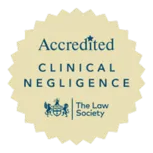How Simpson Millar Helped
After accepting instructions for this Sepsis compensation case, our Medical Negligence Solicitors started investigating liability by obtaining a copy of Tom’s medical records. We subsequently instructed a general surgeon to review the records and prepare a report concerning whether or not the care that was provided was of an acceptable standard.
The expert report concluded that some aspects of the care had been negligent and this had resulted in development of systemic Sepsis, scarring and had also put the client at an increased risk of future complications, including bowel obstruction.
On the basis of the above evidence, our Medical Negligence Solicitors sent a Letter of Claim to the Trust setting out why it was considered the care provided had been negligent. A Letter of Claim is a document that should contain a summary of the facts on which the claim is based, the main allegations of negligence and causation, an indication of the nature of all injuries that have been sustained including current condition and prognosis and an indication of any other financial losses.
The Trust responded by way of Letter of Response, denying liability. But after further communication with the Trust, an agreement was finally reached between the parties as to which aspects of the care were negligent.
The Outcome
Tom was awarded damages of around £9,000 in compensation for the pain and suffering he endured, as well as his loss of earnings. The figure reflected the fact that the occurrence of the appendicitis could not have been avoided.
Helping people with Sepsis Claims
If you or a loved one suffered from Sepsis as a result of medical negligence, you could claim compensation.
Our expert Medical Negligence Lawyers understand how serious sepsis is and the lifechanging physical, psychological and emotional impact of this illness. Symptoms of Post Sepsis Syndrome, last anywhere from 6 to 18 months. If you or a loved one has experienced this, our specialist Solicitors will give you a free assessment to determine whether you have a claim. We can talk you through the legal process in detail and support you through your claim from start to finish. We encourage you to call our dedicated and friendly team on 0800 260 5010 to make the first step in your claim.
What Are Some Examples of Medical Negligence?
Examples of medical negligence include:
- Injuries caused during surgery
- Delayed or incorrect diagnosis of a medical condition
- A healthcare provider giving you the wrong prescription
- Failure to warn you about the risks of treatment
- Not getting your informed consent before carrying out a treatment
You could be awarded medical negligence compensation if any of these have happened to you. If you’re not sure about a potential claim, contact us for free advice.










